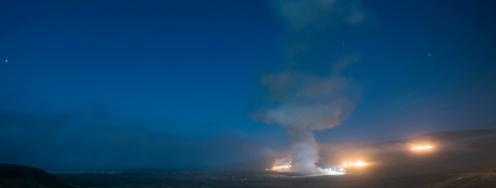How Will Iran Respond to Strikes on Syria?
On the radar: Opportunity costs; Regret for when we turned a blind eye; Russia’s deteriorated early warning radars; Pakistan tries to be reassuring; the Hazards of prompt global strike; and the Rodent threat to US nuclear missiles.
On the radar: Opportunity costs; Regret for when we turned a blind eye; Russia’s deteriorated early warning radars; Pakistan tries to be reassuring; the Hazards of prompt global strike; and the Rodent threat to US nuclear missiles.
September 4, 2013 | Edited by Benjamin Loehrke
Collateral damage - A U.S. strike on Syria risks scuttling a potential diplomatic solution on Iran’s nuclear program. Iran’s President Hassan Rouhani was elected largely on a plan to fix Iran’s economy and ease Iran’s isolation by resolving its nuclear impasse with the West. However, if the U.S. strikes Syria, it could embolden hardliners in Iran’s government and harm the chances of negotiating a deal that keeps Iran from getting a nuclear bomb, writes Yeganeh Torbati for Reuters.
--Washington might not appreciate the risk, as a favorite talking point for striking Syria is that it could restore credibility in US red lines and convince the Iranians that the US means business. "There's a valid argument to be made that U.S. inaction in Syria will embolden Iran to move forward with its nuclear ambitions. There's an equally valid argument that if the U.S. attacks Syria, Iran will feel an even greater need for a nuclear deterrent," said Karim Sadjadpour. Full article here. http://reut.rs/1dGZrn6
History lesson - “Saddam Hussein’s unchecked use of mustard gas, cyanide and other chemical weapons against Iranian front lines left Tehran with both a deep abhorrence of chemical weapons and a deep skepticism of the international community that did nothing to enforce the treaties banning their use. The question, analysts say, is what Iran does with those feelings,” writes Karl Vick for TIME. http://ti.me/14joGsD
Acknowledging past wrongs - To mitigate negative reactions from Iran to potential US military strikes on Syria, it might be useful for the U.S. to issue a statement of regret about its tolerance of past chemical weapons use by Iraq against Iran, writes Greg Theilmann in Arms Control Now. Such a statement might resonate with Iranians, including those still suffering the effects of those chemical attacks.
--”The negative Iranian reaction would also be mitigated by an explicit invitation to the Rouhani government to join the other involved parties to the multilateral negotiations over Syria first proposed by Russia and the United States. Iran is part of the problem; it needs to be part of the solution as well,” writes Theilmann. Full post here. http://bit.ly/14qwovD
Meanwhile, in Tehran - Iranian officials have publicly condemned the chemical attacks in Syria as well as military strikes against Syria. The Iran Primer from USIP has a list of quotes from officials, including Khamenei, Rouhani, Zarif, Larijani, Rafsanjani and Jafari. http://bit.ly/14jkatY
Welcome to Early Warning - Subscribe to our morning email or follow us on twitter.
--Have a tip or feedback for the editor? Email earlywarning@ploughshares.org earlywarning@ploughshares.org. Want to support this work? Click here.
Tweet - @armscontrolnow: Iran's Rouhani to speak at yearly U.N. session in New York http://t.co/u30N0Rdt5Q
Interesting timing - ”As Tensions Rise in Syria, Israel Conducts ‘Routine’ Missile Test” by Allen McDuffee for Danger Room. http://bit.ly/1dPl1qF
Ambiguous warning - The Russians said that their early warning radars, designed to detect a nuclear first strike against the country, picked up two missile launches in the Mediterranean that were associated with an American-Israeli missile defense test. Though, as The New York Times noted, “the lack of details in state media reports raised the question of whether Russian officials knew precisely what had occurred.”
--This event does not bolster confidence in Russia’s early warning radar capabilities, the deterioration of which are a big threat to strategic stability, notes Jeffrey Lewis at Arms Control Wonk. Click for an… unforgettable picture of Brezhnev. http://bit.ly/14qBVCD
Nothing to see here - “Pakistan on Tuesday described its nuclear policy as one of ‘restraint and responsibility’ and declared that it has a well-established regimen of controls to ‘ensure the safety and security’ of its nuclear facilities,” writes Pamela Constable for The Washington Post on Pakistan’s response to recent leaks showing the US intelligence community’s increasing worry about Pakistan’s political stability and nuclear controls. http://wapo.st/15yHO6F
Prompt global anxiety - “A new report warns that future U.S. non-nuclear rapid-strike arms could pose a little-understood risk of crossing tripwires to global conflict if a major military power could not determine whether it is being targeted in a quickly unfolding attack,” writes Elaine Grossman of Global Security Newswire. http://bit.ly/13dXtEY
--Full report: ”Silver Bullet? Asking the Right Questions About Conventional Prompt Global Strike” by James Acton of the Carnegie Endowment. PDF moored here. http://bit.ly/19iyBwx
Keep buying our stuff! - “The head of Boeing Co's defense business defended his company's work on a U.S. ground-based missile defense system even though it failed to intercept a missile during a test in July, and called for more frequent testing in the future,” reports Andrea Shalal-Esa for Reuters. http://reut.rs/1dPeiwI
Report - “Great Expectations: The P5 Process and the Non-Proliferation Treaty” by Andrea Berger and Malcolm Chambers for RUSI. (pdf) http://bit.ly/15yJqh0
Events:
--”Guarding Against a Nuclear-Armed Iran: Proliferation Risks and Diplomatic Options.” Discussion with Amb. Thomas Pickering, David Albright, George Perkovich and Daryl Kimball. September 5 from 9:00-10:30 AM @ the Carnegie Endowment. Details and RSVP here. http://ceip.org/1dweZbK
--”Striking Syria: Obama, Congress and Military Action.” Discussion with Michael Doran, Fiona Hill, Suzanne Maloney, Bruce Riedel, Jeremy Shapiro and Michael O’Hanlon. September 5, 3:00-4:30 PM @ Brookings. Details here. http://bit.ly/1ajiLXg
--”The Path to Zero: The role of the United Nations in Nuclear Disarmament and Non-Proliferation.” September 5, 10:00 AM. Webcast here. http://webtv.un.org/
--”Prospects for a Diplomatic Solution with Iran,” Ray Takeyh, Joel Rubin, and Greg Thielmann. September 10, 12:30-2:00 PM @ The American Security Project. Details here. http://ow.ly/ow7H1
--”U.S.-Iran Reconciliation Under President Rouhani?” Haleh Esfandiari, Robert Einhorn, Kenneth Katzman. Moderated by Barbara Slavin. September 12, 9:30 AM @ the Atlantic Council. Details here. http://ow.ly/ow8uO
Dessert:
Tweet - @Nuclearinfo: Kah-boom! UK Ministry of Defence releases reports on 2009 collision between UK and French nuclear weapon submarines: http://t.co/1WOVuelco2
The smallest threat to the triad - The 150 nuclear-armed missiles based in Montana remain poised for prompt launch in case of nuclear war with the Russians, but they are ill-equipped to deal with their fiercest enemy - the Richardson’s ground squirrel.
--The squirrels, commonly found in Montana, have a nasty habit of digging tunnels around ICBM perimeter fences, setting off motion sensors and forcing security teams to investigate “thousands” of false alarms each year. The rodents are also damaging missile infrastructure, digging under foundations and chewing on cables. Smithsonian Magazine reports on the strategic squirrel threat and potential defense measures. http://bit.ly/15DBuEh
--YouTube video of squirrel damage near ICBM silos, along with the proposed squirrel defense systems. From the National Wildlife Research Center. http://bit.ly/1a6JJOf



